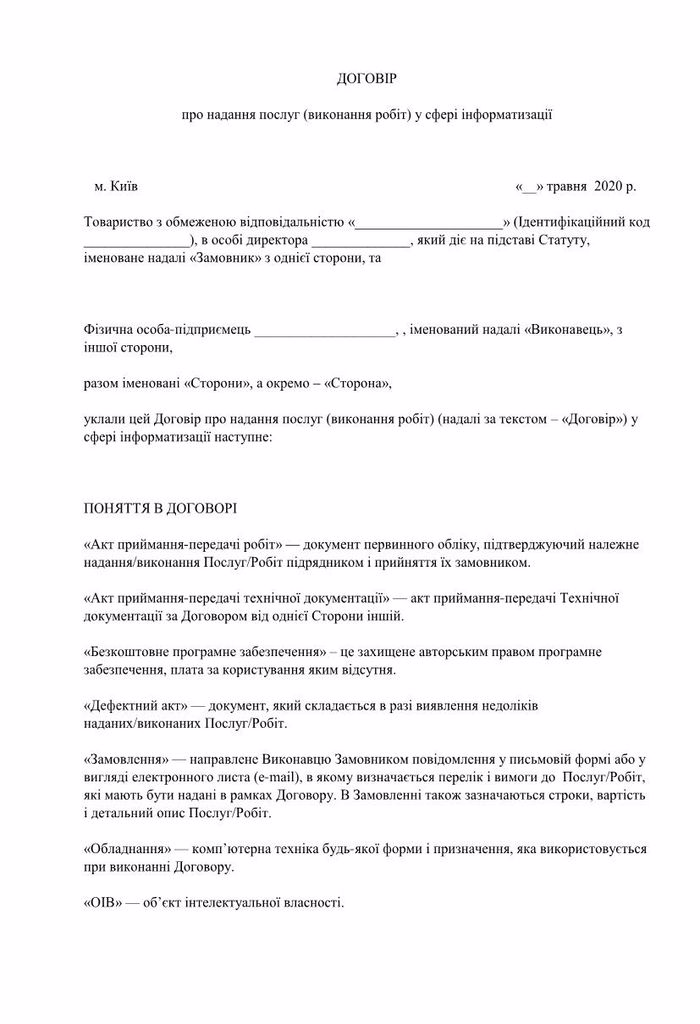Special aspects of contractual relations in the field of IT

Today the market of IT services in Ukraine is one of the best in the world. Every year Ukrainian HEI’s (higher education institutions) graduate thousands of new specialists in the field of information technology and government services every day register dozens of subjects of entrepreneurial activity that will provide services in the field of IT.
This material will be interesting both to those who are just going to start their own company, and to those who are employed in an IT enterprise. We will talk about the following topics here:
- Initial activities of the company (signing of lease agreements, purchase of equipment, hiring personnel).
- Choosing the optimum tax system.
- Signing and proofreading of employer and employee contracts.
If you still have any questions regarding any agreements or contracts in the IT field, please contact our specialists for the advice!
Related article: Legal aspects of startup investing in Ukraine
Where to begin?
The usual cycle of founding an IT company, regardless of its size, begins with the purchase of the necessary equipment and rental of premises. Unfortunately, not all landlords in the real estate market are ready for an honest and open dialogue.
Therefore, the contracts that sometimes have to be signed when buying or renting an office have so-called "pitfalls", which can be spotted only if you have a qualified lawyer.
In addition, when establishing an IT company, the owners and employees have enough things to do without adding this, because from the very beginning, it is necessary to launch projects for their further implementation so that the company “does not stand idle”.
Another stage that exists in parallel with the issue of recruitment, equipment purchase and rental of premises is the stage of choosing a tax system and optimizing the tax base of IT business. Ukrainian legislation provides for a few mechanisms created for IT companies. However, there are well-known optimization options as well as the ones individually developed by our experts. Therefore, this issue is limited only by the wishes of the customer of legal services.
Related article: Provided legal advice on the organization of it-business in Ukraine
Typically, tax issues do not go separately from the issue of formalizing the employment relationship of IT professionals. And this topic is interesting not only for the employer but also for the employee. To understand the situation, we have collected the most common types of contracts in this area, with a brief assessment of the possible risks and benefits for both parties.
Time and material
When to use: when it is difficult to determine the scope of work and the execution deadline.
Work, according to this type of contract, is divided into separate stages and paid in a certain period (after completion of work, once a quarter, once a month), according to the volume and quality of work performed. Convenient is the fact that in this way it is possible to carry out large projects in small parts.
A separate advantage of this contract is its flexibility, since the work can begin even from the moment when there are no technical documents or specifications, and then be supplemented and amended. Thus, the Customer can influence the progress of work at any time, thanks to transparency and significant involvement in the project. Which will affect the result, confirming the expectations.
However, this type of contract, besides its advantages, also has a number of disadvantages for the Customer.
The first disadvantage of this type of contract is the significant involvement of the Customer in the project and the need for at least a minimum set of project management skills.
Due to the lack of a full understanding of the scope and terms, additional costs may arise that may not be provided for from the very start of the project.
In addition, there is a chance that the Customer will run into unscrupulous contractors who will constantly inflate the time and cost of work performed, which can also affect the project budget.
Fixed price
When to use: mainly by customers who need to develop a small project with precise deadlines and budget. This type of contract has the basic conditions for the price that must be agreed upon before the start of work. In such an agreement, risks for violation of deadlines usually rest on the Contractor, who sometimes can complete the project earlier, compromising quality. In addition, unlike Time and Material, it is impossible to make additions to the project in the classic Fixed price.
Waterfall
When to use: when it is necessary to establish a clear technical task for the Contractor, and register it before the start of work. It provides for the staged implementation with the division into clear steps, however, unlike the Time and Material contract, in the classic Waterfall, the project is carried out without division into parts. That is, it is impossible to move on to the next stage of execution without ending the previous one.
Agile
When to use: this type of contract also has its own peculiarity, however, unlike the previous ones, it is even more flexible and adjusted to constant changes. It fixes the basis of motives, concept and development ideas. Here the parties are partners rather than the Contractor and the Customer. However, in order to secure relations against any possible disputes, it is better to provide for the essential terms that are there in any typical contract for the implementation of projects.
Out staff
When to use: when you need to provide for a specific number of hours for specific specialists, and not the entire team or company as a whole. Also, the Our Stuff contract may provide for the hours of work of the manager who will manage the project. However, it is not worth signing such agreements without sufficient experience on the part of the Customer.
Summing up, we can say that the list of the above-mentioned agreements is not exhaustive, because there are dozens of modifications and dozens of subtypes of these or other agreements that we have not brought up today.
However, our lawyers are used to working with an IT field, and are not afraid of difficulties, which means they can help in the development of any contract regarding IT company services, contracts for the provision of IT services or any other contracts in this field.
Our clients






